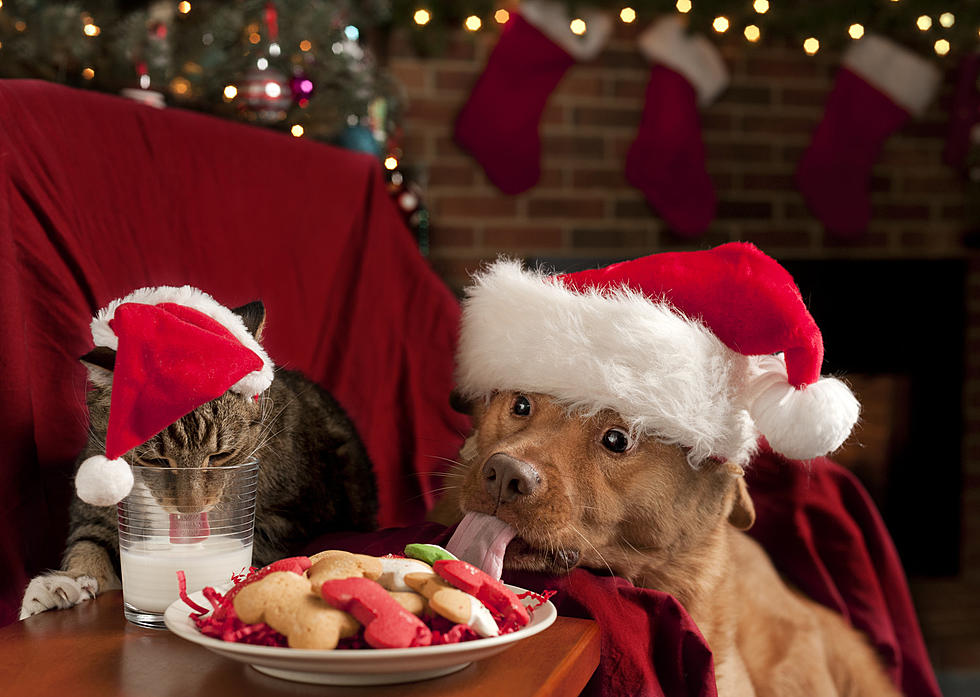
Holiday Foods You Should Definitely Avoid Giving Your Pets
Whether you're a dog lover, a feline friend, or a fan of both, we sometimes forget that "man's best friend" should not be eating some of the things we like to dine on. Sometimes, out of habit, we share table scraps with our pets without thinking if it's really good for them or not.
This can happen even more so during the holiday season when some of us tend to over-indulge. With so many great appetizers, entrees, and desserts to eat, it's only natural for us to want to spread the wealth with our pets. But, be careful.

First and foremost, turkey is a big food item for many of us at holiday time. However, keep in mind that according to veterinary experts, eating turkey or turkey skin is harmful to certain pets, especially dogs. Eating turkey could cause canines to get a life-threatening condition called pancreatitis.
Also, some vegetables that are used to season many of our favorite holiday dishes, such as onions and garlic, are harmful to dogs and cats. These strong, spicy vegetables can cause severe damage to your pet's digestive system and even damage red blood cells.
Let's quickly run down some other foods that are potentially dangerous for dogs and/or cats:
- Chocolate - Chocolate contains caffeine and theobromine(methylxanthines) which are toxic to pets and cause a range of symptoms from vomiting, diarrhea, seizures, and even death.
- Coffee - Coffee obviously includes caffeine and can cause the same symptoms described above.
- Apple, cherry, and peach pits.
- Candy - Such as chocolate and any candy containing the sweetener Xylitol which is toxic to pets.
- Lemons, limes, oranges - Citrus fruits, which contain citric acid, are another problem for pets, especially cats. Citric acid can lead to depression of the central nervous system.
- Grapes and raisins - This one is strange because the reason these are toxic to pets remains unknown. However, eating them can cause kidney failure in dogs and cats.
- Macadamia nuts, walnuts, pecans, almonds - Certain nuts can lead to pancreatitis in cats.
- Salt - In large amounts, salty foods can lead to numerous negative symptoms including death.
- Raw foods - Uncooked items such as eggs, meat, or fish can potentially carry deadly bacteria like Salmonella or E. coli. These types of bacteria can cause food poisoning.
- Alcohol - Drinks and foods containing alcohol can cause serious problems in pets including vomiting, breathing difficulties, and death.
And finally, here's one that I bet not many cat owners are aware of(including myself up until a few years ago): Dairy products. How many of us cat owners have served our cats a dish of milk or a dab of cream a time or three? Heck, I had a cat named Daisy that would literally "scream for cream".
Turns out, many cats are lactose intolerant. Therefore, their little tummies can't process dairy and that causes gastric and digestive problems. It's only fair and loving to give your pets some extra treats especially during the holiday season, but perhaps first, you speak with your vet to find out what works best with your pet's diet.
RANKED: Here Are the 63 Smartest Dog Breeds
Gallery Credit: Sabienna Bowman
Why do cats have whiskers? Why do they meow? Why do they nap so much? And answers to 47 other kitty questions:
Gallery Credit: Andrew Lisa
LOOK: Here Are 30 Foods That Are Poisonous to Dogs
Gallery Credit: Rachel Cavanaugh
KEEP READING: Here are 6 foods from your cookout that could harm your dog
More From WNAW AM









